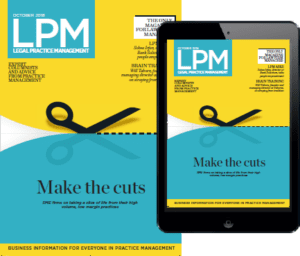
Reviews and social media – meeting prospective clients where they are
Search engine optimisation is crucial to winning business for today’s law firm, and having a demonstrably good reputation helps – according to Scott Brown, managing director, Accesspoint Media Services.
Choosing a firm to handle difficult cases can be overwhelming at the best of times, but when you consider clients entering the online search engine and being presented countless law firm options at the touch of a button, picking the right firm becomes even harder.
Competition amongst SME firms remains very high and because of this, firms should perhaps consider looking at ways to stand out. One method that seems to be considered last is search engine optimisation (SEO). This process should be on the mind of any firm wishing to make a memorable online presence. If you keep in mind that every single word matters when writing and designing content, you will soon see how SEO can boost your website and elevate it amongst competitors.
When done correctly, SEO can be one of the most powerful processes under your belt, especially within the legal world. Keeping on top of SEO can bring in low-cost organic traffic to your firm’s website, which could ultimately lead to converting more leads to clients.
To fully understand how to achieve a successful SEO strategy, consider learning what you are up against by carrying out competitor research and benchmarking. When it comes to SEO, Google is possibly the best benchmark for understanding the ranking system as it is a widely used search engine.
For example, the Google ranking system is designed to filter out the excessive amount of information online, so clients can make their choice fast and efficiently. With new searches being looked up every day, Google’s ranking systems are made up of many different algorithms to help sort through hundreds of billions of worldwide results and web pages, until you’re left with your most relevant and authoritative results at the top.
Various factors should be considered when carrying out an SEO strategy: remember that throwing in a bunch of buzzwords simply won’t work anymore and in fact, could work against your firm. Take a moment to imagine a potential visitor: they search for ‘divorce solicitor’ and a ton of results appear, all containing ‘divorce solicitor’. The results that show up could range from firms in and around the UK to firms that no longer operate, but still have their website running. Therefore, how does Google know to filter out irrelevant results from the ones that are likely to be of use to the prospect? They do it by not only looking at keywords, but also by looking at your location, how current your content is, how you explain divorce law, relevant articles to support the content and what other high authority websites are linked to you.
This brings us to our next point of ranking high with Search Engines. Adding reviews and testimonials is becoming a must, not only because it clearly represents your firm’s ability to satisfy your clients and showcases your services, but also because testimonials demonstrate to potential future clients that your firm is reputable and trustworthy in handling cases. As a result, this will enable your site to show up higher on Google ranking.
Right now is the best time to look into this quick and easy way to gain more authority with your website, especially because there are now PMS- integrated review applications available. The effective PMS integrations enable your firm to easily capture reviews as you close a client’s case, with those reviews collected and saved on the client’s file. Not only does this save your firm precious time and resources (as fee earners will not have to manually chase up clients for feedback), but it also gives your firm full control of what information is required and what type of cases are followed up on so that no sensitive matters are pursued. Once everything is set up to the firm’s liking, your firm could easily reach a larger audience as reviews will not only show up on Google, but also other forms of online communications such as Facebook, Twitter and LinkedIn where they can be shared.
Creating an SEO strategy is certainly investing in the long game, as the process is delicate and constantly changing. Therefore, it could be worth considering teaming up with a legal marketing specialist who fully understand what can make or break an SEO strategy. They will be fully aware of how to manoeuvre Google’s ranking system with ongoing maintenance, as well as making your website appear more reputable to potential clients through creating and posting content specifically optimised for search.

Standing out in a crowded online landscape
A website means business for a law firm – from first contact with clients to keeping them on board and satisfied. Scott Brown from Accesspoint Media Services explains how to optimise this journey.
With the new digital era in full force, perhaps now is the time to ask yourself: How much is our website and digital branding contributing to the overall goal of standing out in a saturated legal market and providing that all-important client experience?
Take a moment to imagine your client’s journey, from the moment they realise they need help with legal services to the moment their case begins. The first thing that a person will do is search for a firm that can offer them help in their specific area. How easy do you think it would be for the prospect to find your firm? Remember, many firms are offering the same services as you, so what exactly puts your website at the top of the list and entices someone to visit.
Seach engine optimisation (SEO) plays an important role in ensuring your firm is visible to anyone who may be looking. Without an effective SEO strategy on your side, countless opportunities may be missed and any resources that have gone into your website could become void as visits to your website are few and far between. Imagine it like this, you’ve planned an amazing party without sending out any invitations – how will people know to show up?
One thing to keep in mind – SEO is a very delicate tool, and all too often firms find themselves unknowingly doing their website a disservice by assuming a full page of content. This may rank highly on search engines, when in reality it could be the downfall of firms. Many popular search engines have become more sophisticated and capable of detecting websites that simply house lots of buzzwords without any meaningful content. Your SEO strategy must be concise, informative, and constantly revisited.
Consider partnering up with a legal marketing specialist, as the level of ongoing maintenance and research may become too much for an already busy firm to take on. The right marketing specialist can truly benefit your firm by developing smart goals to be achieved for the long run, allowing your firm to see dramatic improvements in the amount of traffic going to your site, the target audience being reached, and the chances of a prospect being turned into a client.
The next thing to consider is the fact that as consumers are faced with a range of options, the decision making that goes into staying on a website or leaving now happens much faster. Your website has only a few seconds to grab the prospect’s attention, so ideally no time can be wasted on poorly designed layouts and old-fashioned functionality. Think about how your site could be aesthetically pleasing without being cluttered, and incorporate colours and images that reflect your overall brand and way of thinking.
A word of advice – avoid using rigid website templates, as this can make it much harder to customise on the go and adapt in the future. An effective website should have a flexible template such as WordPress that can face ever-changing market demands and host the various integrations that clients expect, thus providing them with a seamless online experience.
A specific integration that is becoming more essential seems to be web forms, as they enable a secure and fast stream of communication between the firm and client. Many software developers that understand the importance of smart working have gone one step further to create web forms that are joined up with your PMS – creating the ability to automatically inject the data from your website enquiry forms and create a prospective client directly within your PMS. The possibilities don’t stop there, as valuable data will be within reach in a matter of seconds, automated tracking and analysing from reports can be made to provide your firm with an in-depth look at conversion rates from prospect to client, along with the revenue made from web forms.
This reduction of admin time and increase in data-driven efficiency, as well as improved performance for the team and clients, is what makes web forms the perfect place to start when looking at integrations.
Consider exploring new ideas and innovative marketing suggestions for your website and branding – it could be the difference between your firm outshining the competition or getting lost in the crowd.
Most Popular

Where are the challenges for SME law firm leadership changing?

The leading annual picture of SME law firms' changing strategic priorities
TA Triumph-Adler provides tailored support to meet compliance requirements

Law firms undertaking identity verification checks must register as an ASCP

Robust onboarding processes are fundamental to effective risk prevention

Osprey Approach's webinar explores the benefits of a digital-first approach




